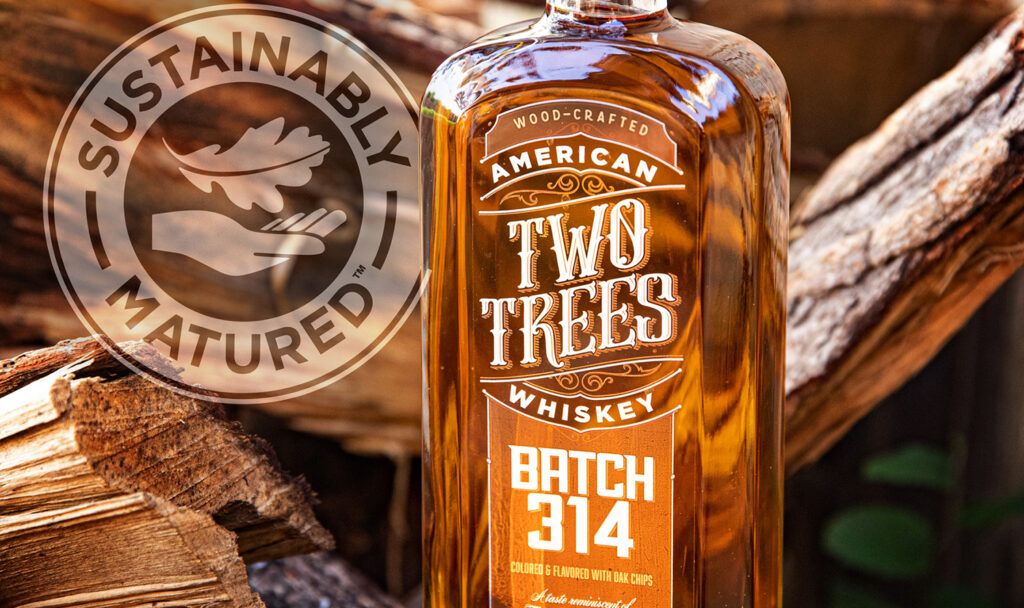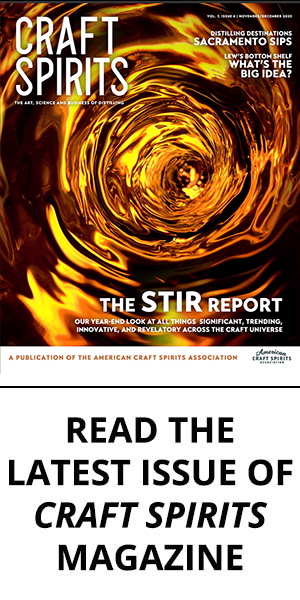
Two Trees Beverage Co. of Fletcher, North Carolina, has unveiled its Sustainably Matured initiative for sustainable maturation for beer (including IPAs), wine and spirits. The company has used its sustainable approaches for its own line of spirits and is now offering to help other companies reduce their carbon footprint through two innovative processes.
Consumers, brands and retailers across the globe are becoming increasingly conscious of what they purchase, source and procure as it pertains to the total impact their footprint has. This results in pivotal changes in production and marketing efforts to embrace sustainable practices and reduce carbon emissions throughout a company’s ecosystem of partners in each product’s lifespan.
“We can help companies reduce their carbon footprint and total enterprise emissions in specific areas of the total equation. Particularly in the beverage production, maturation and warehouse stages of a product’s lifespan,” said Chad Slagle, CEO of Two Trees, in a press release. Wine, beer and spirits companies that use traditional barrel-aging techniques can significantly reduce their CO2 emissions through Two Trees’ proprietary, sustainable maturation processes.
Two Trees’ Sustainably Matured initiative reduces the industry’s dependency on wood and other factors that add up in calculating total GHG emissions from a product’s life cycle.
In climate change, a feedback loop is something that speeds up or slows down a warming trend. A negative feedback loop reduces the effect of change and helps maintain balance. Both of the Two Trees maturation processes significantly minimize the usage of wood versus traditional barrel-aging. This creates a negative feedback loop. Using less trees results in less deforestation. Deforestation is a major contributor to global warming and climate change.
Currently the supply for oak barrels used for traditional aging of alcohol products cannot sustainably meet the demand. In fact, only one to three barrels are produced from a single tree. Generally speaking, this means for every 200 barrels the cost is 100 trees that have aged and contributed to CO2 reduction for over 70 years. This puts a strain on our forests which absorb CO2 and help combat global warming. Two Trees can decrease the spirits industry’s wood dependency by 90% through its sustainable maturation process that utilizes less than 10% of the wood that is required in traditional barrel-aging. Their process for sustainably maturing beer and wine goes even further by utilizing less than 2% of the wood that is used in traditional barrel-aging.
In fact, Two Trees can produce the equivalent of 50 barrels or 2,650 gallons of matured spirits product with just two trees when traditional barrel-aging would require 25 trees to do the same. Additionally, these methods reduce carbon emissions by helping products reach peak maturation levels sooner, going from years to just 24 hours with less risk, better control and no surprises.
This means when calculating the GHG emissions, the years (N) of each product stored in the warehouse is drastically reduced. In some cases, moving from a multiplier of 15 years to just a fraction of a year. Without the need for rickhouses and rackhouses, not only is the time reduced, but also the percentage of space and energy in warehousing is also reduced through sustainable-maturation processes.
Aging loss (AL) is also a factor in equating total GHG emissions. In the typical barrel-aging process, ethanol is lost to evaporation (commonly referred to as the “angels’ share”). The average annual loss to evaporation for each product is applied as a loss factor contributing to the total GHG emissions of the product for every year the product sits in a warehouse. This is not only a problem for GHG emissions, but it also reduces product yield by up to 20% when the ethanol vapor evaporates, impacting profitability for the enterprise. Furthermore, angel’s share often leads to Baudoinia compniacensis, also known as whiskey fungus. When the ethanol vapor combines with moisture in the air and falls back to earth it creates dirty, black, sticky spores that become a nuisance and eye sore. Two Trees eliminates aging loss (angel’s share) in production and storage, significantly reducing carbon footprints of the brands it serves through both sustainable maturation processes.
Two Trees utilizes a 1,000-gallon system on a contract basis to produce and sustainably mature spirits at scale to the volume equivalent of approximately 20 barrels of aged product per tank, per day. Two Trees also offers a barrel-aged concentrate which sustainably matures wine and beer, including IPAs. These compounds are pre-oxidized and contain antioxidants to reduce free radical compounds in the fermented product while providing finishing touches to deliver premium wood-crafted taste. Beer companies can expand their flavor profiles by building from their core beers or test how much further products like IPAs, darker beers and beer with higher ABV can improve with sustainable maturation. In fact, this method is the only one of its kind to produce barrel-aged flavor in an IPA. For brands that are already barrel-aged, adding the Two Trees extract can produce “double-barrel” premium results. Alternatively, the extracts are also used to provide balance to sour beers. The Two Trees sustainable approaches add the depth and character of barrel-aging without the excess CO2 emissions, aging loss, and additional warehousing while saving trees. Brands that utilize either of the sustainable approaches can use the Sustainably Matured logo to indicate their proactive approach in reducing their carbon footprint.
“We are delivering on-trend, barrel-aged taste profiles through natural, sustainable maturation that provides unmatched consistency, agility and speed-to-market for brands across alcohol categories. We aren’t talking goals, we’re taking action and we encourage beer, wine and spirits producers to do the same,” added Slagle.
“Our sustainable solutions are solving many issues simultaneously. We can sustainably address the global shortage of sufficiently aged stock with less supply chain risk factors. As demand and costs rise faster than supply, we can help brands provide a consistent product without having to put products on allocation or shorting orders,” said Chris Sellers, the company’s president.


